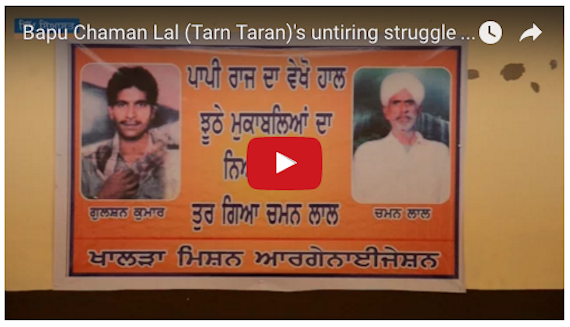Sikh News » Special News
After Two Decades, Punjab High Court Orders Expeditious Trial of Cops in Extra-Judicial Killings and Fake Encounters in Punjab
January 4, 2018 | By Parmjeet Singh
Chandigarh: About two decades after registration of cases against police personnel involved in systematic and wide-spread extra-judicial killings, fake encounters and enforced disappearances in Punjab, the Punjab and Haryana High Court has now ordered expeditious trail in these cases. The court upheld the trial court order and said that that Central government’s sanction for prosecuting police officials accused of fake encounters and extra-judicial killings would arise only after prosecution had presented its evidence. The court said that such sanction was not required at the initial stage of trial and directed the trial court to proceed on expeditiously in these cases and frame a schedule for recording evidence of prosecution at the earliest.
Notably, the Punjab government was seeking blanket protection for the accused police officials by saying that these officials had risked their lives to bring out the state from a grave situation during 1990s and “now prosecuting for the act done by them during discharge of their duties will affect morale of police force”. But in the 77-page judgement on 27 petitions involving nearly fifty accused police officials, Justice Surinder Gupta rejected the Punjab government’s contentions.
According to a report in The Indian Express (IE), the petitioners had cited Section 6 of the Punjab Disturbed Areas Act and section 197 of Code of Criminal Procedure (Cr. P. C.) in support of their contention that sanction for prosecution was required for the initiation of trial.
“Revision petitions have no merits, as such, dismissed with above observations. However, applications if any, filed by petitioners under Section 6 of the Act of 1983 or Section 197 Cr.P.C. can be kept pending by trial Court by passing a brief order if it is of the opinion that the evidence on file do not suggest nexus of the incident with the discharge of official duties of petitioners or calling for sanction as per provisions of Section 6 of the Act of 1983 and decide the same at appropriate stage”, the court order read.
“After filing of chargesheet in these cases a long period has lapsed and the prosecution evidence is yet to start. It is neither in the interest of the prosecution nor petitioners that sword of prosecution keeps on hanging over their heads for such a long period. The trial court is directed to proceed further in the matter expeditiously and frame a schedule for recording evidence of prosecution at the earliest and then to allow petitioners to lead defence evidence, if required, in support of their plea”, the final order read.
READ FULL JUDGEMENT by PUNJAB and HARYANA HIGH COURT:
Most of the cases relate to the 1990s and were handed over to the CBI for investigation. The CBI found the encounters to be fake and staged. In 2001, when the chargesheet was field in the cases in the CBI special court at Patiala, the accused policemen raised the objection saying there is no sanction order for the prosecution from the Centre. They approached the High Court, which even at that time, dismissed their plea, after which they approached the Supreme Court of India. The SCI took about 16 years to send back the cases to the trial court in 2016 for a fresh look. The trial court held its ground and ordered that it would look into the question of sanction at a later stage, after assessing the evidence against the officers.
The accused police officials again approached the High Court against the trail court order, which had been under stay since 2016. The petitioners had sought discharge in these cases.
The stay on trial court proceedings had ended on December 20 last year and according to The Indian Express (IE) the court order was made public on January 3, 2018.
It is pertinent to note here a number of reports by Human rights bodies of international stature have documented the evidence that custodial torture, enforced disappearances, extra-judicial killings, secret cremations were widespreadly practised in a systematic manner by the Indian forces in Punjab during 1980s-90s and this resulted in mass level abuse of human rights. The Indian state has practised the policy of impunity in Punjab as a result the abusers did not face any action. Only a few cases are in exception to it where the cases were inquired by the CBI under directions of the Supreme Court of India but even in these cases the trial is yet to begin even after decades. Many primary witnesses passed away in this period – for example, in first case mentioned by the High Court in its judgement under consideration, Bapu Chaman Lal- who was primary witness to the extra-judicial custody, torture and cremation of his son Gusham Kumar passed away few months back. Human rights activists believe that the delay tactics is also part of Indian state’s policy of impunity and even the role of Indian judiciary has remained highly disappointing in these cases.
ALSO WATCH THIS VIDEO:
To Get Sikh Siyasat News Alerts via WhatsApp:
(1) Save Our WhatsApp Number 0091-855-606-7689 to your phone contacts; and
(2) Send us Your Name via WhatsApp. Click Here to Send WhatsApp Message Now.
Sikh Siyasat is on Telegram Now. Subscribe to our Telegram Channel
Related Topics: CBI, Fake Encounters, Human Rights, Indian Politics, Indian State, Punjab and Haryana High Court, Punjab Police, Punjab Politics





